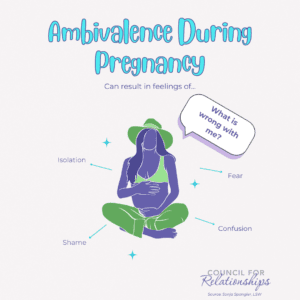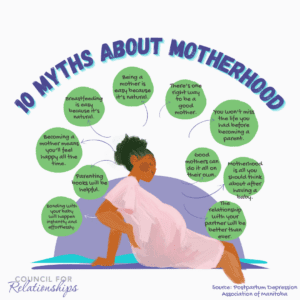Ambivalence During Pregnancy: Navigating the Unspoken
Pregnancy is often portrayed as a time of joy and anticipation, but for many, it’s a period marked by complex emotions. Ambivalence during pregnancy, a state of having mixed feelings about the impending arrival of one’s baby, is a common yet seldom discussed phenomenon. This silence fosters a sense of isolation, shame, and fear, leading many to wonder, “What is wrong with me?”
This blog aims to shed light on the reality that feelings of ambivalence during pregnancy are entirely normal. We endeavor to navigate this unspoken territory by exploring the roots, implications, and strategies for managing such feelings, offering solace and understanding to those who tread its paths.
Introduction to Ambivalence During Pregnancy
Ambivalence about one’s baby during pregnancy is frequently experienced but rarely discussed. According to a 2018 study, over a quarter of women in the United States expressed ambivalence about their last pregnancy.
Many women stay silent because ambivalence is a sensitive topic to discuss with others. Consequently, shame, isolation, and fear arise as they ask, “What is wrong with me?” The answer: nothing! Feelings of ambivalence during pregnancy are completely normal.
The Reality of Ambivalence: It’s Normal
“Ambivalence” is a state related to having mixed feelings about something. It can look like excitement about the baby during pregnancy while also dreading pregnancy and motherhood. You might want to have a connection to the baby but not feel a strong attachment to it yet. You might feel love for the baby while resenting its presence in your body.
Ambivalence can take many different forms at various stages throughout pregnancy. Here, I will focus on ambivalence during the first trimester and some strategies for managing it.
Understanding the Roots of Ambivalence in the First Trimester
For better or for worse, pregnancy in humans lasts a long time. The baby growing inside you begins as an abstraction and grows into a real-life presence over time.
For the first few months of pregnancy, you are experiencing the baby as just that: an abstraction. The only tangible evidence of its presence is how it impacts your body: emotional swings, bloating, fatigue, nausea, etc.
Additionally, you are facing a long journey ahead as you anticipate getting deeper into the pregnancy, giving birth, and being a mother to an infant. You might be grieving a certain lifestyle that you are now leaving behind as a result of the pregnancy. You might be asking yourself, “How will I do this?”
The Journey Through Mixed Emotions: From Anxiety to Acceptance
Many moms-to-be experience physical discomfort and emotional uncertainty during the first trimester of pregnancy. Putting those feelings onto the baby as the source of your pain, especially when your baby has yet to become a fully formed human, is easy.
Physical and Emotional Transitions: Coping Strategies
Try your best to refocus your attention on caring for your own feelings of anxiety, grief, and discomfort. Also, allow yourself some patience as you process these feelings during the first trimester.
You are undergoing a major transition both physically and emotionally—experiencing many conflicting emotions as you confront such a change is normal. You will feel differently as your body and mind adjust to the pregnancy, and the baby becomes more of a real-life presence. For example, you might feel differently when you hear the baby’s heartbeat for the first time, see imaging of the developed baby, or feel fetal movement.
The Cultural Myth of Instant Love: Reassessing Our Expectations
One thing to pay attention to during pregnancy is how you internalize the stories you have been told by culture and society. So often, we hear the narrative of the perfect mother as one who immediately falls in love with her baby and regards it with nothing but care and admiration. We must challenge these narratives to allow room for diversity of experience.
Breaking Down the Binary: Love and Resentment
You are not broken if you don’t immediately fall in love with your baby. Haven’t we already eliminated the “love at first sight” story? Sometimes, love for your baby, as with most other relationships, grows over time. Just as you grow to love your spouse, for example, give yourself permission to let your love grow slowly with your baby.
Another idea that many of my clients attach to is that “I wanted this baby, so I have no right to feel ambivalent about it.” This is thinking too much in black and white. Your mind tells you, “Either you want this baby, or you don’t.” But we can’t think in black and white about human relationships—they are too complex. Intimate relationships are never 100% pure love.
The reality is that there are things about our loved ones that we love and some that we resent or even hate. To resent someone does not mean you don’t love or want them in your life. This can also apply to your pregnancy: you can love your baby but hate the way it’s making you feel. You can be excited about motherhood while dreading the lack of autonomy that comes with it. Allow room for a “both/and” perspective.
The Spectrum of Maternal Emotions: From Previous Experiences to Present Realities
Sometimes, ambivalence during the perinatal phase comes from experience as a mother enters her second pregnancy. She might remember the physical and/or emotional pain of a previous pregnancy. She might feel dread, fear, or sadness as she imagines going through that again.
Second Time Around: Dealing with Expectations and Memories
On the contrary, a mother might have had an incredibly positive experience in the past and be confused or fearful of her current ambivalence. Remember that pregnancy is different every time. No two are the same, whether considering one’s physical or emotional experience.
Knowing this, separating a memory from your present experience is critical. Challenge any assumptions that it will happen in the future because it happened in the past. If your experience of ambivalence is new, try to challenge the assumption that different = wrong. Just because you feel ambivalent now does not mean something is wrong; it just means that your feelings are different than you experienced before.
Opening Up: The Role of Therapy in Addressing Ambivalence
One way I work with ambivalence during pregnancy is to get specific on the client’s fears and concerns. I commonly hear from women who feel ambivalence towards their babies, fearing that they won’t love them. Or that their internal negative feelings will impact the baby in some consequential way. If you trust your therapist, don’t be afraid to discuss these topics in therapy, no matter how “wrong” you think they are.
You are not alone in this experience—perinatal therapists have heard these stories many times before. Take care of yourself by removing isolation, fear, and shame from your ambivalence during pregnancy. Try not to judge yourself. Feelings of ambivalence during this time do not indicate who you are or will be as a mother. They only indicate the difficult transition you are experiencing, so you must show yourself some understanding.
Conclusion: Navigating Ambivalence During Pregnancy
Ambivalence during pregnancy is a nuanced and deeply personal experience many women face. It reflects motherhood’s complex journey, marked by a spectrum of emotions ranging from joy to dread.
Understanding and accepting these feelings as normal can significantly reduce the isolation, shame, and fear often associated with them. As we navigate the unspoken aspects of pregnancy, it’s crucial to challenge societal narratives, seek support, and allow ourselves the grace to experience and express the full range of our emotions.
Ultimately, recognizing the normalcy of ambivalence during pregnancy paves the way for a more compassionate and inclusive understanding of the maternal experience.

CFR Staff Therapist Sonja Spangler, LSW
About CFR Staff Therapist Sonja Spangler, LSW
Sonja Spangler, LSW, is a Staff Therapist at Council for Relationships. Contact her to book a therapy appointment with Sonja if you’re facing mental health challenges, including ambivalence during pregnancy.
Sonja sees individuals, couples, and families in Philadelphia and Paoli, PA (in-person and online) and across Pennsylvania (online). She specializes in the following areas:
- Depression and Anxiety
- Grief, Loss, and Bereavement
- Life Transitions
- Women’s Issues (including postpartum depression)
Tell your family and friends to reach out to her for support.
Parenting and personal growth can go hand in hand. Let CFR’s over 85 individual, couples, and family therapy experts help you build thriving relationships and flourishing communities. See our Therapist & Psychiatrist Directory for CFR therapists or psychiatrists near you.
If this is an emergency, please dial 9-1-1.
More Mental Health Blogs
Did you enjoy this blog? Our expert therapists, psychologists, and psychiatrists offer much more to explore! Check out the CFR Expert Voices blog for great mental and emotional health advice and insight. To get first access to our Expert Voices blog, join our mailing list!


